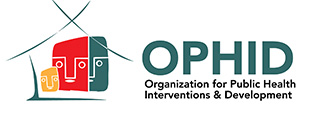RISE: Reaching Impact, Saturation and Epidemic Control and COVID-GO




COVID-GO (2020-2023)
COVID Vaccine Decentralisation
OPHID and its partners implemented the COVID-Go program. The goal of the program was to complement MOHCC’s efforts to vaccinate at least 60% of the population in the 15 districts. This support included provision of locum nurses to administer vaccines, transport, personal protective equipment (PPE) and IEC materials in the form of posters, t-shirts, wristbands, rulers, and calendars. After 11 months, OPHID had supported the MOHCC to administer an addition of 407 158 vaccine doses had been administered, (49% Dose 1; 32% Dose 2).
Caring for Carers
Frontline healthcare workers (HCWs) were significantly infected and affected by COVID19. The pandemic increased risk for stress, burnout, depression and anxiety among HCWs. With limited mental health services available for Health care workers, OPHID partnered with Friendship Bench and the Zimbabwean Ministry of Health and Child Care (MOHCC) to provide mental health care services to Health Care Workers. The program engaged health care workers through facilitated group sessions and an online platform. When screened and identified with “red flags”, the HCWs were referred for additional mental health counselling and therapy. The first phase of the program was implemented from February 2022 to November 2022 and the project reached out to 4,966 HWCs through its various interventions.
RISE (2023-2024)
Building on OPHID’s successful work supporting the Ministry of Health and Child care to decentralise COVID-19 Vaccines under COVID-GO (2020-2023), in 2023 OPHID joined the RISE consortium through USAID.
This work comprises of two mechanisms:
Mechanism 1: RISE Vaccine Delivery Response in Zimbabwe
Through the RISE project, OPHID and its partners propose an initiative to capitalize on lessons learned during the COVID-19 vaccination rollout and provide technical guidance to policymakers, health managers, and communities for future pandemics. The objective of the project will be to provide technical guidance on the integration of COVID-19 and other adult vaccinations into primary health care, specifically for priority populations (aging, chronic disease, pregnancy and lactation).
The project will implement the following activities:
- Design, develop and distribute a series of advocacy briefs to set a foundation for dialogue with MOHCC and other key stakeholders for improved planning for future vaccination rollout activities and integration of new vaccines into both public and private health systems.
- Hold two workshops to improve microplanning and pandemic preparedness:
- Workshop 1: to develop new or update existing operational tools (planning and data tools) to track vaccination uptake among adults for routine and emerging diseases
- Workshop 2: to develop advocacy and health communication planning around adult vaccinations messaging and advocacy for targeted groups, development of IEC materials (posters, etc.) to display at health facilities.

Mechanism 2: Caring for Carers Healthcare Workers Mental Health Support
Learning from the first phase of the project, OPHID presents its project work plan for mental health support under the ‘Caring for Carers’ RISE project for the implementation period of 1 June 2023 – 29 February 2024. The need for mental health services among healthcare workers remains. There is an opportunity to modify the approach and reduce the barriers to uptake which were brought to light during this project. Proposed modifications to the project include providing more self-help materials, supporting onsite group awareness, and ongoing screening and referrals for HCWs who need mental health support.
OPHID in partnership with MOHCC and Friendship Bench will provide mental health services to HCWs in Zimbabwe. OPHID will coordinate and provide technical oversight, including engagement of MOHCC to support step-wise referral pathways for mental health services and coordination of onsite group sessions within health facilities. Friendship Bench, the sub-partner will be responsible for facilitating the open line (mobile and web-based services), providing counseling and referrals for stepped-up care, and upskilling of the existing MOHCC mental health nurses to provide talk therapy to fellow health care workers.
Key Achievements
- 2840 Health care workers sensitised on available mental health services.
- 2956 Health care workers participated in group MH sessions
- 57% of Health care workers demonstrating in common mental disorders (CMDs) at six weeks follow up
- 19 District Mental Health Focal Points trained in group session facilitation and problem-solving therapy (PST)
- 320 Health care workers identified with red flags received problem-solving therapy (PST)
